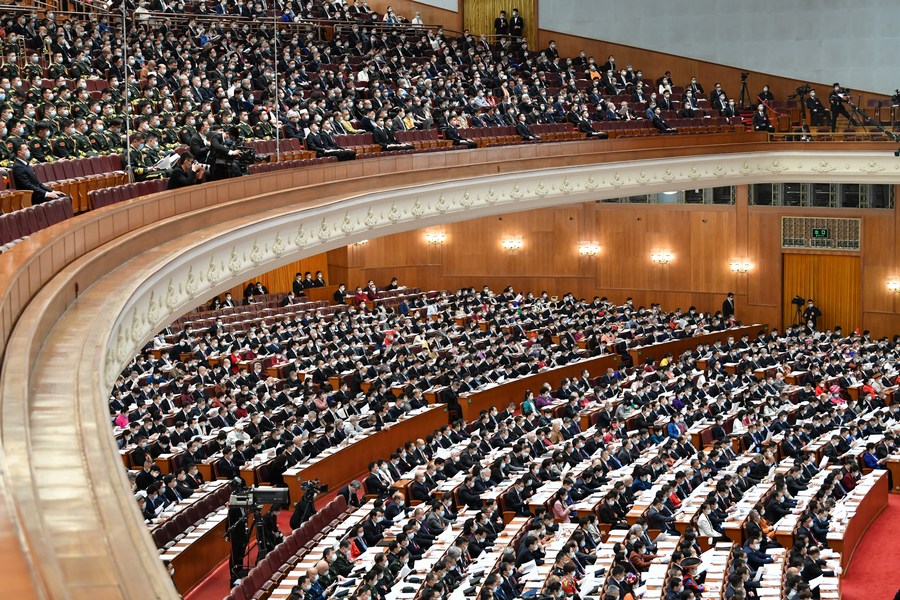
The fifth session of the 13th National People's Congress (NPC) opens at the Great Hall of the People in Beijing, capital of China, March 5, 2022. (Xinhua/Gao Jie)
BEIJING, March 9 (Xinhua) -- Lawmakers and political advisors pooled wisdom on achieving common prosperity at the ongoing "two sessions."
Zhang Tianren, a national lawmaker from Xinchuan, a mountainous village in China's eastern province of Zhejiang, said the village almost missed an opportunity to boost their fruit industry due to fund shortages. However, with the incorporation of a shareholder mode -- a bright spot of Zhejiang's pursuit of common prosperity by inviting villagers to become shareholders and gain dividends -- the opportunity was able to bear fruit.
By establishing companies and inviting local villagers to invest, the village has built a production base for the "diaogua," a locally produced melon-like fruit, which is expected to bring 1.2 million yuan (about 190,000 U.S. dollars) of annual revenue, said Zhang, the village's Party chief and the president of Tianneng Co., Ltd.
"Incorporating the shareholder mode not only solves fund shortages of village development but also makes full use of villagers' spare money and provides them with a new income channel," said Zhang.
Such efforts, aiming to increase incomes via boosting local industries and reasonable distribution, revealed the underlying logic of China's path toward common prosperity -- "making a bigger and better cake" first through joint efforts of the people, and then dividing and distributing the cake properly.
Gao Peiyong, vice president of Chinese Academy of Social Sciences and a national political advisor, highlighted the importance of diligence, hard work and entrepreneurship, noting that common prosperity does not mean building an egalitarian or welfare state.
Thanks to the grassroots exploration of new income channels and supportive policies, the per capita disposable income of residents in 26 mountainous counties in Zhejiang increased faster than the provincial average in 2021, local authorities said.
Yet, more efforts are still needed to achieve common prosperity, considering the disparities in terms of regional growth, urban-rural development and access to public services, among others, in the country, experts said.
"A vital step toward common prosperity is to increase the government's spending in addressing weak links in people's wellbeing," said Xu Hongcai, deputy director of the Economic Policy Commission under the China Association of Policy Science.
Xu called for further leveraging taxation measures to narrow wealth gaps, strengthening social security networks, and enhancing subsidies for low-income groups.
In 2022, China's central government transfer payments to local governments will see a growth of 18 percent, or around 1.5 trillion yuan, the largest increase in recent years. Much of the new funds will be channeled to prefecture- and county-level government, with meeting people's living needs one of the priorities, according to this year's government work report.
China will increase support for public-interest preschool education and encourage universities and colleges to enroll more students from central and western regions and rural areas, the report said.
Special attention has been given to improving social security policies concerning flexible employment, referring to new employment forms that currently cover about 200 million people in China.
Li Dongsheng, chairman of Chinese electronics giant TCL Group and a national lawmaker, proposed setting up an independent platform within the national social security system for workers of flexible employment and standardizing labor contracts to protect their legitimate rights and interests.
As the country enters the era of the digital economy, China can also leverage the role of digital tools in promoting common prosperity.
By building a digital government, the country is improving its public services, tilting more favorable policies and market information toward rural areas, and creating more opportunities for job seekers and economic growth, said Jiang Ying, deputy CEO of Deloitte China and a national political advisor. ■



